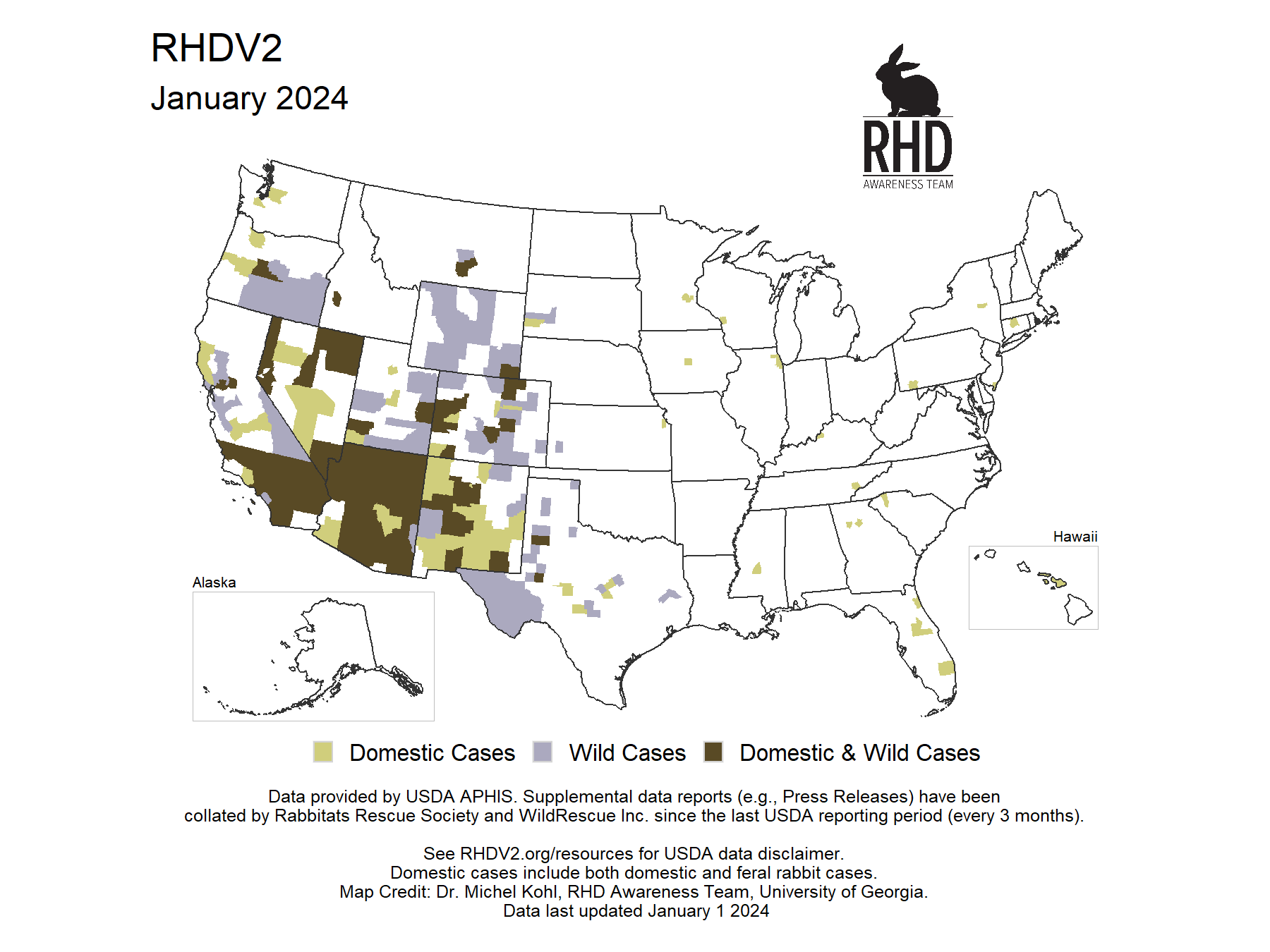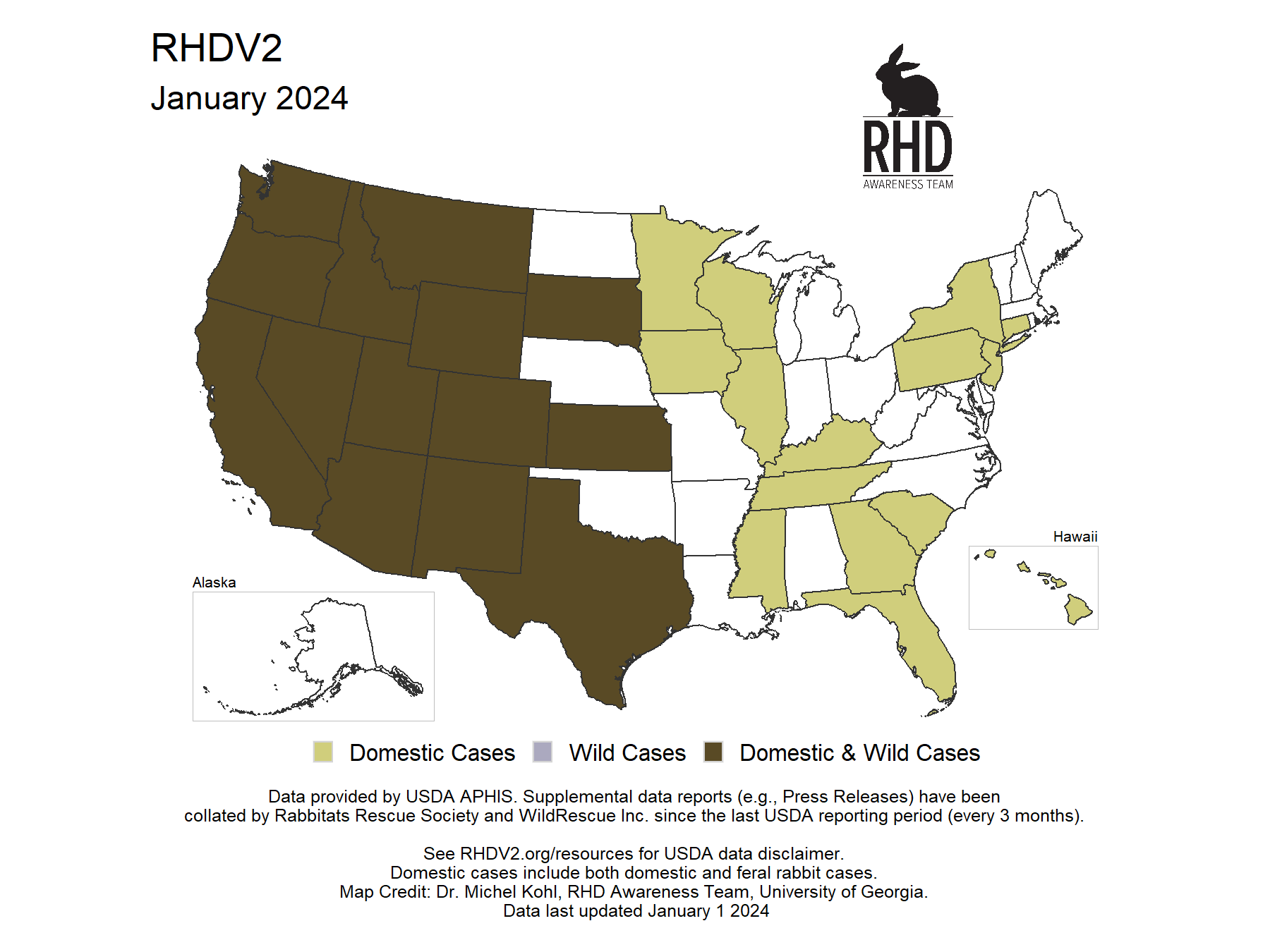Rabbit Hemorrhagic Disease (RHDV)
Protecting your rabbit against Rabbit Hemorrhagic Disease Virus (RHDV2)
Rabbit Hemorrhagic Disease is a highly contagious, often deadly disease caused by a calicivirus that affects both wild and domestic rabbits. It is not contagious to people or other animals. Since early 2020, RHDV2 has been causing deaths in rabbits and hares native to North America and has been spreading rapidly in western states.
3/18/24 UPDATE: New detections of Rabbit Hemorrhagic Disease in California. Disease has been detected in domestic and/or wild rabbits in twenty-six California counties - considered endemic in those counties. CDFA taking limited regulatory action.
SACRAMENTO, March 18, 2024 – RHDV was detected in domestic rabbits in San Mateo County on February 23 and a wild black-tailed jackrabbit in Butte County on February 23, 2024. It was previously detected in a domestic rabbit on February 28, 2023.
The first two months of 2023 have seen new RHDV2 confirmations in wild rabbits in California, Texas and Wyoming, including spread into newly affected counties. Rabbit Hemorrhagic Disease is considered endemic in most Western US states and has also killed domestic rabbits in several Eastern states https://rhdv2.org/maps/.
RHDV2 has been detected in domestic and/or wild rabbits in twenty-four (24) California counties and the California Department of Food and Agriculture (CDFA) considers the disease endemic in those counties. CDFA is taking limited regulatory action. RHDV2 has continued to spread in Northern California with recent detections in wild jackrabbits in Santa Clara, Sacramento, Glenn, Colusa and Napa Counties.
California Department of Food and Agriculture (CDFA) has confirmed cases of rabbit hemorrhagic disease in wild or domestic rabbits in these counties https://www.cdfa.ca.gov/AHFSS/Animal_Health/RHD.html since October 2022: Alameda, Colusa, Glenn, Marin, Napa, Sacramento, Santa Clara Solano and Yolo Counties. San Diego and Los Angeles Counties’ most recent confirmed cases were in June 2022, but there is every reason to believe the disease is still active in our area.
In addition to detection of RHDV2 in wild cottontail rabbits and jackrabbits, RHDV2 has been confirmed in domestic rabbits in California on 64 premises, as well as two detections in feral domestic rabbits (in Alameda and Ventura Counties).
Even if your rabbit is kept inside, they are still at risk of becoming infected with RHDV. While RHDV only affects rabbits, the disease can be transmitted or transferred to them by people or animals through contact with objects, animals, insects, or predator feces contaminated by the virus.
Below is the most recent map available showing how much the disease has spread.
Disease Progression Video
Symptoms May Include
Loss of appetite
Lethargy
High fever
Seizures
Jaundice
Bleeding from nose, mouth, or rectum
Difficulty breathing
Sudden death (most common presentation)
CDFA recommends that rabbit owners prevent contact with wild rabbits and jackrabbits, and if possible, keep domestic rabbits indoors in areas with known disease. Owners are also asked to vaccinate their pet rabbits and practice biosecurity to prevent accidentally spreading the RHDV2 virus to their rabbits.
Other Ways to Protect Your Rabbits
Vaccinate your rabbit against RHDV2 on a yearly basis
Keep your rabbit indoors, this means no outdoor playtime or living outdoors.
Do not let your rabbit come into physical contact with other rabbits from outside your home.
Wash your hands before and after handling your rabbit.
Change your clothes if you have come in contact with other rabbits.
Disinfect shoes and other objects that may be contaminated.
Quarantine any new rabbit in the home for at least 18 days.
Use rabbit safe monthly flea treatments (as prescribed by your veterinarian only) for rabbits, cats and dogs.
Contact your veterinarian if your rabbit becomes sick.
Any sudden rabbit death is suspicious and should be reported to a veterinarian immediately. The public is urged to call the California Department of Fish and Wildlife at (916) 358-2790 if dead wild rabbits are sighted, and to avoid contact or file a report through the CDFW website.
Movement Restrictions for Rabbits and Hares Entering California
Due to the ongoing outbreak of Rabbit Hemorrhagic Disease (RHD) in the U.S., California has implemented a statewide quarantine with movement restrictions for rabbits and hares entering California.
No rabbits, hares, or their products (meat, pelts, hides, carcasses, etc.) and equipment or other items or associated materials may enter California from states or countries where Rabbit Hemorrhagic Disease (RHD) has been diagnosed in the prior 12 months unless they meet the following requirements.
All live rabbits and hares require a Certificate of Veterinary Inspection, and must be inspected by an accredited veterinarian within 72 hours prior to shipping to California. The CVI must include a statement by an accredited veterinarian certifying that:
All rabbits and hares in the shipment have been examined for and found free of communicable diseases, and
All rabbits and hares have originated from a single premises that has no signs of a communicable disease, and
There have been no movements of rabbits and hares onto the premises over the prior 30-days, and
The animals have had no contact with wild rabbits or hares in the past 30 days.
No rabbits and hares or rabbit and hare products (meat, pelts, hides, carcasses, etc.) and equipment or other items or associated materials may enter California from a premises known to be affected with RHD.
Medgene Labs (Brookings, SD) received Emergency Use Authorization from the United States Department of Agriculture’s Center for Veterinary Biologics (CVB) for their experimental vaccine for prevention of Rabbit Hemorrhagic Disease Virus serotype 2 (RHDV2). The new vaccine is a killed recombinant vaccine which is authorized as a two-dose series, with the second dose given 21 days after the first. Medgene Labs has distributed their vaccine to California licensed veterinarians since October 2021. Rabbit owners should contact their private veterinarian if they are interested in vaccination for RHD.
For more information about RHDV2, please visit https://www.cdfa.ca.gov/AHFSS/Animal_Health/RHD.html.
To find clinics who have the RHDV2 vaccine, click here.
RHDV2 Vaccine Information
Vaccinating your rabbit against RHDV2 and getting the recommended booster shot annually is the most effective way to protect them from RHD. Multiple vaccines have been developed to prevent RHDV2 infection and death around the world, but the one your veterinarian will be using is the two-dose RHDV2 vaccine from Medgene which has been in use under emergency use authorization since October 2021. This vaccine is the first to be developed and manufactured in the U.S. and has been widely administered to many thousands of rabbits.
It’s important that you complete all recommended doses in the recommended timeframe to achieve protection for your rabbit, and that you follow up with recommended boosters. Your veterinarian will go over any possible side effects that may be related to your vaccine options. In addition to vaccination, the best way to protect your rabbit is to house them indoors (with no outdoor access) in a safe, clean environment.
As with any approved or authorized vaccine, the RHDV2 vaccine options have been found to be highly effective and safe. Also like other vaccines, they are not 100 percent effective in all cases, so you will want to practice biosecurity measures at home for more protection and peace of mind.
-
The Medgene RHDV2 vaccine is a two-dose series given 21 days apart, with full protection reached 14 days after the second dose. A booster is required annually, but data shows immunity is strongest for 6-7 months. SDHRS requires proof of both doses or an up-to-date booster to access services. Learn more from the Medgene FAQs
-
RHDV2 is a highly contagious and fatal disease affecting domestic and wild rabbits. The Medgene vaccine, developed in the U.S., provides strong protection with proven safety and immunity lasting at least six months. Vaccination and biosecurity remain the only effective defenses against this virus
-
Rabbit Hemorrhagic Disease Virus (RHDV2) is a highly contagious and deadly virus affecting rabbits of all ages. It spreads through direct contact, contaminated materials, and even insects. Since 2016, RHDV2 has become endemic in parts of the U.S. Vaccination and strict biosecurity practices are the best defenses to protect domestic and wild rabbits.
Other Recommended RHDV2 Best Practices Include the Following
Wash your hands before and after handling rabbits, other animals, or their food and water bowls.
Leave your shoes outside or in the garage and do not track the virus inside.
Change your clothes when you get home before approaching your rabbit.
Disinfect items that may be contaminated, including clothes, with a disinfectant that kills RHDV2 (we recommend Rescue).
Do not feed your rabbit foraged greens. Rinse all greens thoroughly for two minutes.
If you have dogs or cats, wash their paws after being outdoors.
Use a monthly flea treatment formulated for rabbits.
Quarantine new rabbits for at least 18 days.
Rabbit Hemorrhagic Disease is very serious, and protecting your rabbit will take effort. The best way to make these biosecurity measures easier to sustain is to build them into your routine. Simple tricks save time and energy, like rinsing your rabbit’s greens before putting them away from the grocery store or keeping a shoe bin and slippers near the door. We also recommend referring to the latest RHDV2 updates and recommendations provided by your state veterinarian’s office.



